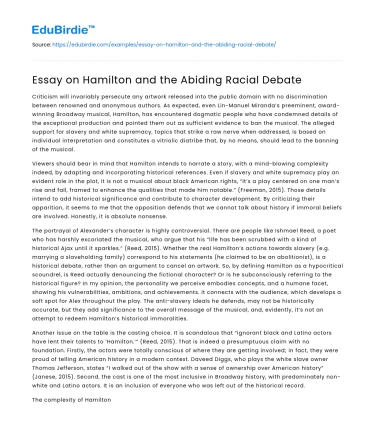Criticism will invariably persecute any artwork released into the public domain with no discrimination between renowned and anonymous authors. As expected, even Lin-Manuel Miranda’s preeminent, award-winning Broadway musical, Hamilton, has encountered dogmatic people who have condemned details of the exceptional production and pointed them out as sufficient evidence to ban the musical. The alleged support for slavery and white supremacy, topics that strike a raw nerve when addressed, is based on individual interpretation and constitutes a vitriolic diatribe that, by no means, should lead to the banning of the musical.
Viewers should bear in mind that Hamilton intends to narrate a story, with a mind-blowing complexity indeed, by adapting and incorporating historical references. Even if slavery and white supremacy play an evident role in the plot, it is not a musical about black American rights, “It’s a play centered on one man’s rise and fall, framed to enhance the qualities that made him notable.” (Freeman, 2015). Those details intend to add historical significance and contribute to character development. By criticizing their apparition, it seems to me that the opposition defends that we cannot talk about history if immoral beliefs are involved. Honestly, it is absolute nonsense.
Save your time!
We can take care of your essay
- Proper editing and formatting
- Free revision, title page, and bibliography
- Flexible prices and money-back guarantee
The portrayal of Alexander’s character is highly controversial. There are people like Ishmael Reed, a poet who has harshly excoriated the musical, who argue that his “life has been scrubbed with a kind of historical Ajax until it sparkles.” (Reed, 2015). Whether the real Hamilton’s actions towards slavery (e.g. marrying a slaveholding family) correspond to his statements (he claimed to be an abolitionist), is a historical debate, rather than an argument to cancel an artwork. So, by defining Hamilton as a hypocritical scoundrel, is Reed actually denouncing the fictional character? Or is he subconsciously referring to the historical figure? In my opinion, the personality we perceive embodies concepts, and a humane facet, showing his vulnerabilities, ambitions, and achievements. It connects with the audience, which develops a soft spot for Alex throughout the play. The anti-slavery ideals he defends, may not be historically accurate, but they add significance to the overall message of the musical, and, evidently, it’s not an attempt to redeem Hamilton’s historical immoralities.
Another issue on the table is the casting choice. It is scandalous that “ignorant black and Latino actors have lent their talents to ‘Hamilton.’” (Reed, 2015). That is indeed a presumptuous claim with no foundation. Firstly, the actors were totally conscious of where they are getting involved; in fact, they were proud of telling American history in a modern context. Daveed Diggs, who plays the white slave owner Thomas Jefferson, states “I walked out of the show with a sense of ownership over American history” (Janese, 2015). Second, the cast is one of the most inclusive in Broadway history, with predominately non-white and Latino actors. It is an inclusion of everyone who was left out of the historical record.
The complexity of Hamilton and the variety of topics it comprises leaves a full set of perspectives that are open to discussion. Any approach to delicate matters in American history will be confronted. For instance, what would have been the public’s reaction to an all-white cast? Regardless of what people might argue out of thinly veiled jealousy or to create controversy, we must set the prejudices apart and give the musical a shot. Watching Hamilton is a life-changing experience; frankly, I do not see why we should deprive the world of enjoying it, just because a few decided to converge their attention on “immoral” details.
References:
- Freeman, J. B. (2015, November 11). How Hamilton Uses History. Slate. Retrieved from https://slate.com/culture/2015/11/how-lin-manuel-miranda-used-real-history-in-writing-hamilton.html
- Janese, B. (2015, July 07). ‘Hamilton’ Roles Are This Rapper’s Delight. The Wall Street Journal. Retrieved from https://www.wsj.com/articles/hamilton-roles-are-this-rappers-delight-1436303922
- Reed, I. (2015, August 21). “Hamilton: the Musical:” Black Actors Dress Up like Slave Traders…and It’s Not Halloween. Counterpunch. Retrieved from https://www.counterpunch.org/2015/08/21/hamilton-the-musical-black-actors-dress-up-like-slave-tradersand-its-not-halloween/






 Stuck on your essay?
Stuck on your essay?

